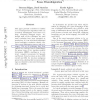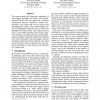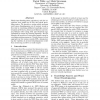34 search results - page 1 / 7 » Combining Unsupervised Lexical Knowledge Methods for Word Se... |
ACL
1997
13 years 6 months ago
1997
This paper presents a method to combine a set of unsupervised algorithms that can accurately disambiguate word senses in a large, completely untagged corpus. Although most of the ...
EMNLP
2009
13 years 2 months ago
2009
This paper presents a supervised method for resolving metonymies. We enhance a commonly used feature set with features extracted based on collocation information from corpora, gen...
CICLING
2003
Springer
13 years 9 months ago
2003
Springer
This paper presents a graph-theoretical approach to lexical disambiguation on word co-occurrences. Producing a dictionary similar to WordNet, this method is the counterpart to word...
EMNLP
2004
13 years 6 months ago
2004
This paper explores the large-scale acquisition of sense-tagged examples for Word Sense Disambiguation (WSD). We have applied the "WordNet monosemous relatives" method t...
ACL
1998
13 years 6 months ago
1998
Word sense disambiguation algorithms, with few exceptions, have made use of only one lexical knowledge source. We describe a system which t)erforms word sense disambiguation on al...



